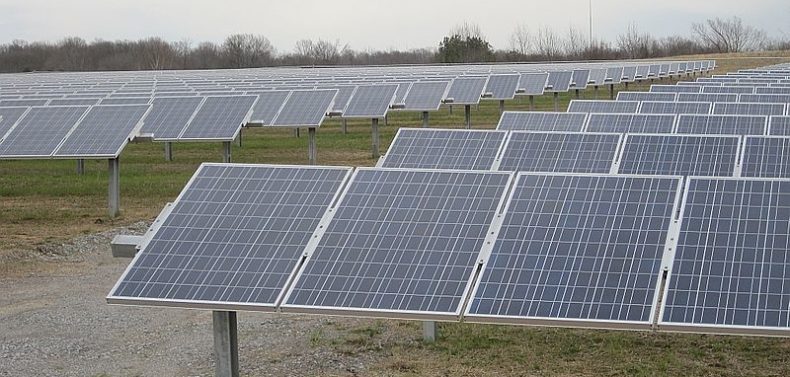When it comes to climate change, if the federal government won’t do something about it, then, kind of like Thanos, we have to do it ourselves.
Not by killing off half the population, of course (although the big purple guy did have a point—that would go a long way toward solving the problem). A new group called 100% Athens, which includes members of Athens for Everyone and the Georgia Climate Change Coalition, is pushing the Athens-Clarke County government to commit to ensuring all of the electricity consumed in Athens comes from clean, renewable sources.
“Paris is a really, really good first step, but it is not enough,” Ted Terry, director of the Georgia chapter of the Sierra Club, said at a recent forum, referring to the climate accords that President Trump pulled out of earlier this year. “We have to do more.”
The forum, held at the ACC library Dec. 16, drew about 50 people, including Mayor-elect Kelly Girtz, commissioners Mariah Parker and Melissa Link, and commissioners-elect Patrick Davenport, Tim Denson and Ovita Thornton.
One hundred cities with a total population of 40 million have already set a similar goal, according to Terry, and they could get three quarters of the way to the Paris benchmarks on their own. A few have already achieved it, including Burlington, VT and Aspen, CO. But those cities have their own municipal electric utilities. Complicating matters for Athens, most of our electricity comes from Georgia Power, a private company that’s regulated by the state. Achieving the 100 percent renewable goal will require working with Georgia Power and the Public Service Commission, and Georgia Power has been reluctant to add much solar to its portfolio, despite the urging of some PSC members, including Winterville’s Tim Echols.
“I think solar is clearly the technology we have really figured out and nailed in this state,” said Jennette Gayer, executive director of Environment Georgia. It’s not enough, though—she envisions solar as being about 25 percent of the mix, with another 25 percent coming from offshore wind farms and 50 percent from energy conservation.
Currently, most of Georgia’s electricity comes from burning natural gas, with some from coal, some from nuclear and a tiny amount from solar. “We’ve got to stop burning stuff,” Terry said. “It’s as simple as that.”
Atlanta recently passed a resolution setting a goal of 100 percent clean and renewable energy by 2035, but it can only reach 65 percent of that goal locally. The other 35 percent would come by purchasing clean energy credits from solar or wind farms outside the city.
In Athens, some efforts are already underway. As part of a SPLOST 2011 project, ACC has installed solar panels on six government buildings, including a 500-kilowatt array at a wastewater treatment plant, and is conducting energy audits, buying hybrid vehicles and replacing old light bulbs with LEDs, ACC Sustainability Officer Andrew Saunders said.
A proposed $72 million judicial center could be considered a sustainability project as well, Girtz added, because it would allow the county to renovate the courthouse and move offices out of old and inefficient buildings. Girtz also floated the idea of partnering with rural counties like Oglethorpe on solar farms. He also said he wants to add to the city’s tree canopy. And the community will face “hard choices” about land use—becoming denser means fewer resources consumed.
100% Athens has submitted a request for $17 million for environmental sustainability in SPLOST 2020, which will go before voters next November. That money could be used to add more solar panels around town, for new and more efficient HVACs, electric vehicles or insulating buildings.
Affordability will be an issue for low-income and middle-class homeowners, as upgrading appliances and adding insulation is expensive. Terry said the PSC is considering a “pay as you save” pilot program in Savannah, where Georgia Power would front homeowners the money for improvements, then take a portion of the energy savings to pay back the debt.
The result of going 100 percent renewable, Gayer said, would be not only cleaner air and a cooler climate, but more jobs. Georgia sends $22 billion a year out of state for energy, she said. Solar and energy efficiency create twice as many jobs as fossil fuels, and the jobs are in Georgia, not in mining states. “If you are installing solar panels on rooftops in Georgia, you are creating local jobs,” Gayer said.
Like what you just read? Support Flagpole by making a donation today. Every dollar you give helps fund our ongoing mission to provide Athens with quality, independent journalism.










